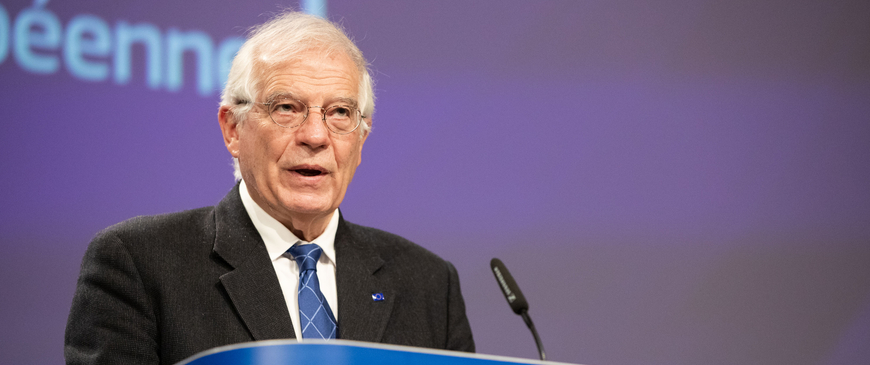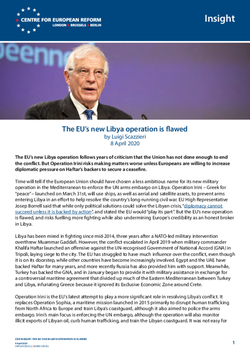
The EU's new Libya operation is flawed
The EU’s new Libya operation follows years of criticism that the Union has not done enough to end the conflict. But Operation Irini risks making matters worse unless Europeans are willing to increase diplomatic pressure on Haftar’s backers to secure a ceasefire.
Time will tell if the European Union should have chosen a less ambitious name for its new military operation in the Mediterranean to enforce the UN arms embargo on Libya. Operation Irini – Greek for “peace” – launched on March 31st, will use ships, as well as aerial and satellite assets, to prevent arms entering Libya in an effort to help resolve the country’s long-running civil war. EU High Representative Josep Borrell said that while only political solutions could solve the Libyan crisis, “diplomacy cannot succeed unless it is backed by action", and stated the EU would “play its part”. But the EU’s new operation is flawed, and risks fuelling more fighting while also undermining Europe’s credibility as an honest broker in Libya.
Libya has been mired in fighting since the middle of 2014, three years after a NATO-led military intervention overthrew Muammar Gaddafi. However, the conflict escalated in April 2019 when military commander Khalifa Haftar launched an offensive against the UN-recognised Government of National Accord (GNA) in Tripoli, laying siege to the city. The EU has struggled to have much influence over the conflict, even though it is on its doorstep, while other countries have become increasingly involved. Egypt and the UAE have backed Haftar for many years, and more recently Russia has also provided him with support. Meanwhile, Turkey has backed the GNA, and in January began to provide it with military assistance in exchange for a controversial maritime agreement that divided up much of the Eastern Mediterranean between Turkey and Libya, infuriating Greece because it ignored its Exclusive Economic Zone around Crete.
Operation Irini is the EU’s latest attempt to play a more significant role in resolving Libya’s conflict. It replaces Operation Sophia, a maritime mission launched in 2015 primarily to disrupt human trafficking from North Africa to Europe and train Libya’s coastguard, although it also aimed to police the arms embargo. Irini’s main focus is enforcing the UN embargo, although the operation will also monitor illicit exports of Libyan oil, curb human trafficking, and train the Libyan coastguard. It was not easy for member-states to agree to launch the new operation. Austria and Hungary argued that the presence of European military vessels in the Mediterranean could be a ‘pull factor’, and encourage more migrants to try the dangerous crossing if they felt there was a greater chance of being rescued at sea. To secure the agreement of all member-states, EU leaders agreed that they would review the operation every four months to make sure it is not having this effect.
The debate over the impact on migration has deflected the attention of EU leaders and observers from what the operation is actually supposed to achieve in Libya.
The debate over the impact on migration has deflected the attention of EU leaders and observers from what the operation is actually supposed to achieve in Libya. In its current design Irini is flawed. The operation is supposed to enforce the arms embargo by land, sea and air, cutting off supplies of weapons to the warring parties in Libya to push them towards peace. While Irini will have aerial, satellite, and maritime assets at its disposal, its focus will clearly be on the naval dimension – intercepting vessels suspected of carrying weapons to Libya. That means Irini will disproportionately affect the GNA, which is mostly supplied by Turkey by sea (Ankara would struggle to supply the GNA via air). Meanwhile, the operation will have little impact on Haftar’s operations, as he receives supplies by air and land across the Libya-Egypt border. These will be harder to track, and impossible for Irini to intercept.
The new EU operation risks therefore strengthening Haftar’s relative position, and removing any incentive for him to halt the siege of Tripoli and agree to a ceasefire. It also fails to put any pressure on his backers to try to restrain him. This will mean increased humanitarian suffering for the inhabitants of Tripoli, at the same time as the coronavirus pandemic spreads through Libya. Furthermore, by appearing to overtly favour one side in the conflict, Irini also risks dealing a fatal blow to the EU’s credibility as an honest broker in Libya, making the Union even more marginal in attempts to address the conflict than it already is.
The new EU operation risks therefore strengthening Haftar’s relative position, and removing any incentive for him to halt the siege of Tripoli and agree to a ceasefire.
There is also a chance that, by weakening the GNA side, Irini could eventually make it possible for Haftar to take control of Tripoli and overthrow the internationally-recognised government of the country. Some EU member-states would not mind this outcome. France has always been supportive of Haftar’s cause, in the hope that he could provide some stability and assist its counterterrorism efforts in the Sahel. Greece and Cyprus have also recently turned towards Haftar as a result of Ankara’s maritime boundaries agreement with the GNA and its gas exploration activities off the coast of Cyprus. For them, the priority is restraining Turkey’s efforts to assert greater control over areas in the Eastern Mediterranean, for which Haftar could be an ally.
However, while some member-states might hope that Haftar could bring some stability to Libya, this is unlikely to be the case. Even if he were able to take Tripoli and overthrow the GNA, it is quite likely that violence would continue in some form, as many Libyans oppose him. His rule would be authoritarian, brittle and unstable. Continued violent unrest and instability could also open up space for the re-emergence of the Islamic State in Libya, where it was defeated by forces loyal to the GNA in mid-2016. Furthermore, as a ruler, Haftar is unlikely to be particularly friendly to European interests: instead he will maintain close links to his erstwhile allies in the UAE, Egypt and Russia, and perhaps seek to build new ones with China too. Finally, at 76 years old, he is unlikely to stay in power for very long.
The Union’s response should take account of the reality of the conflict, and its efforts need to be geared towards pushing Haftar, as the aggressor, to end his offensive. Member-states need to be willing to condemn publicly his attacks on civilians and infrastructure such as hospitals. Although it is predominantly a maritime mission, Operation Irini could still prove useful if member-states make sure it has the right assets to also identify and monitor arms deliveries to Haftar that enter Libya by land and air. While it would not be possible to stop these breaches of the embargo, monitoring could provide valuable additional evidence that could be used to apply political pressure on Haftar’s backers in the UAE and Egypt. This is something member-states have so far been unwilling to do, but if they really want to secure peace in Libya, they have no alternative. Of course, this does not mean Europe should blindly back the GNA, which has its own flaws. But the internationally-recognised government of Libya has shown it is willing to accept a ceasefire. And in any case, such a truce would only be the first step in a lengthy political process leading to a new government to put the country back together.
Although it is predominantly a maritime mission, Operation Irini could still prove useful if member-states make sure it has the right assets to also identify and monitor arms deliveries to Haftar that enter Libya by land and air.
Even if Operation Irini is adjusted and performs beyond expectations, it is not going to resolve the Libyan conflict on its own. Europeans will also need to co-operate with other powers if they want to have any hope of stabilising Libya. They should try to work closely with the US, which appears more alert to developments in Libya now that Russia and Turkey have increased their involvement in the conflict. They should also try to work with Turkey, which has shown a willingness to encourage the GNA to agree to a ceasefire. And it may also be possible to co-operate with Russia: while Moscow backs Haftar it has also maintained links with the GNA, and has appeared willing to de-escalate and push Haftar towards a ceasefire, largely to avoid jeopardising its broader relationship with Turkey.
The EU has often been lambasted for its passivity on Libya. Irini is an attempt to take more responsibility, but on its own it is a flawed one. Acting in ways that make the conflict worse and sharpen humanitarian suffering is even less desirable than taking no action at all. If it really wants Irini to make a positive contribution to peace in Libya, the EU will need to carry out the operation in tandem with a concerted effort to push Haftar to accept a ceasefire and a broader international diplomatic effort to end the civil war. Only then the EU’s new operation will have the best chance of living up to its name.
Luigi Scazzieri is a research fellow at the Centre for European Reform.


Add new comment